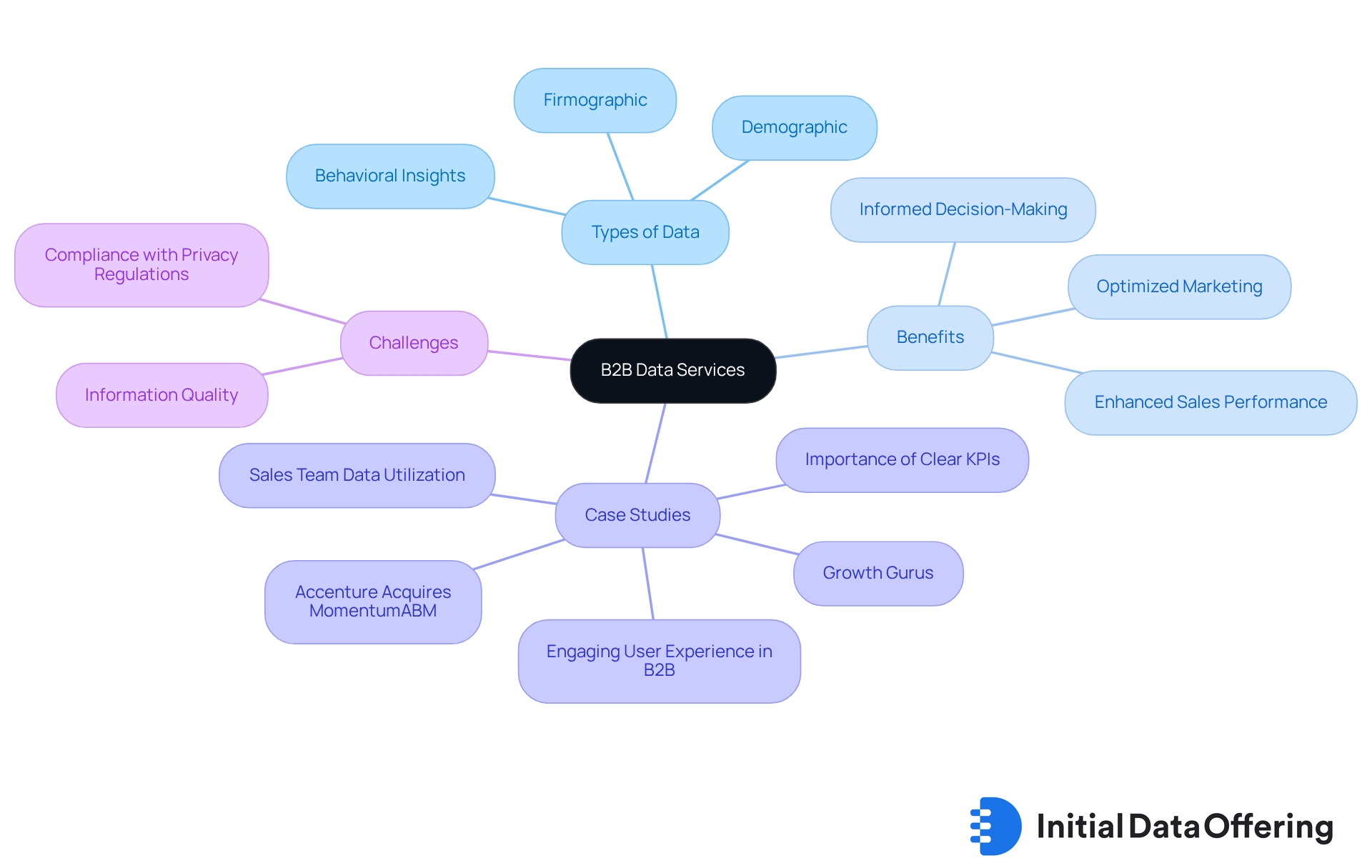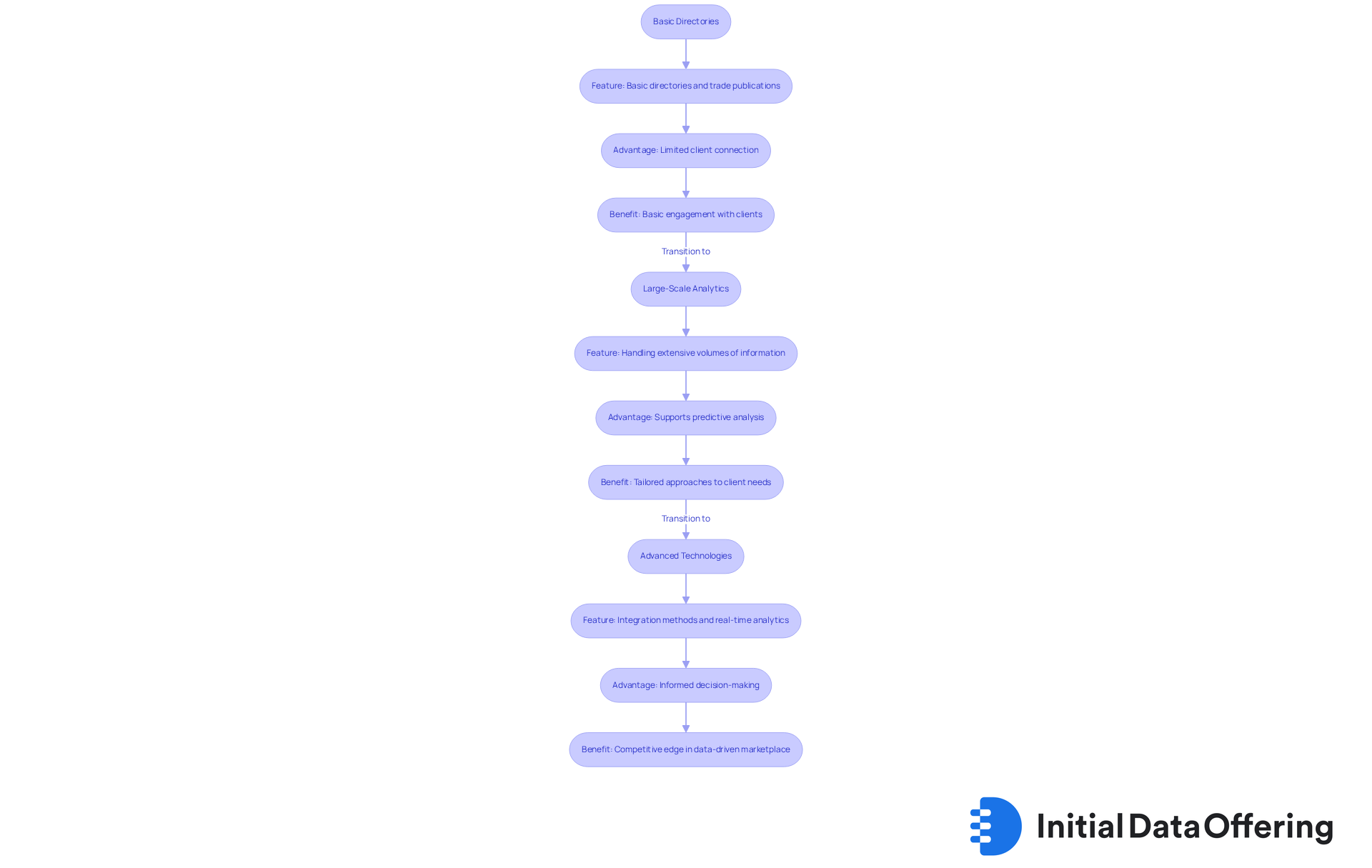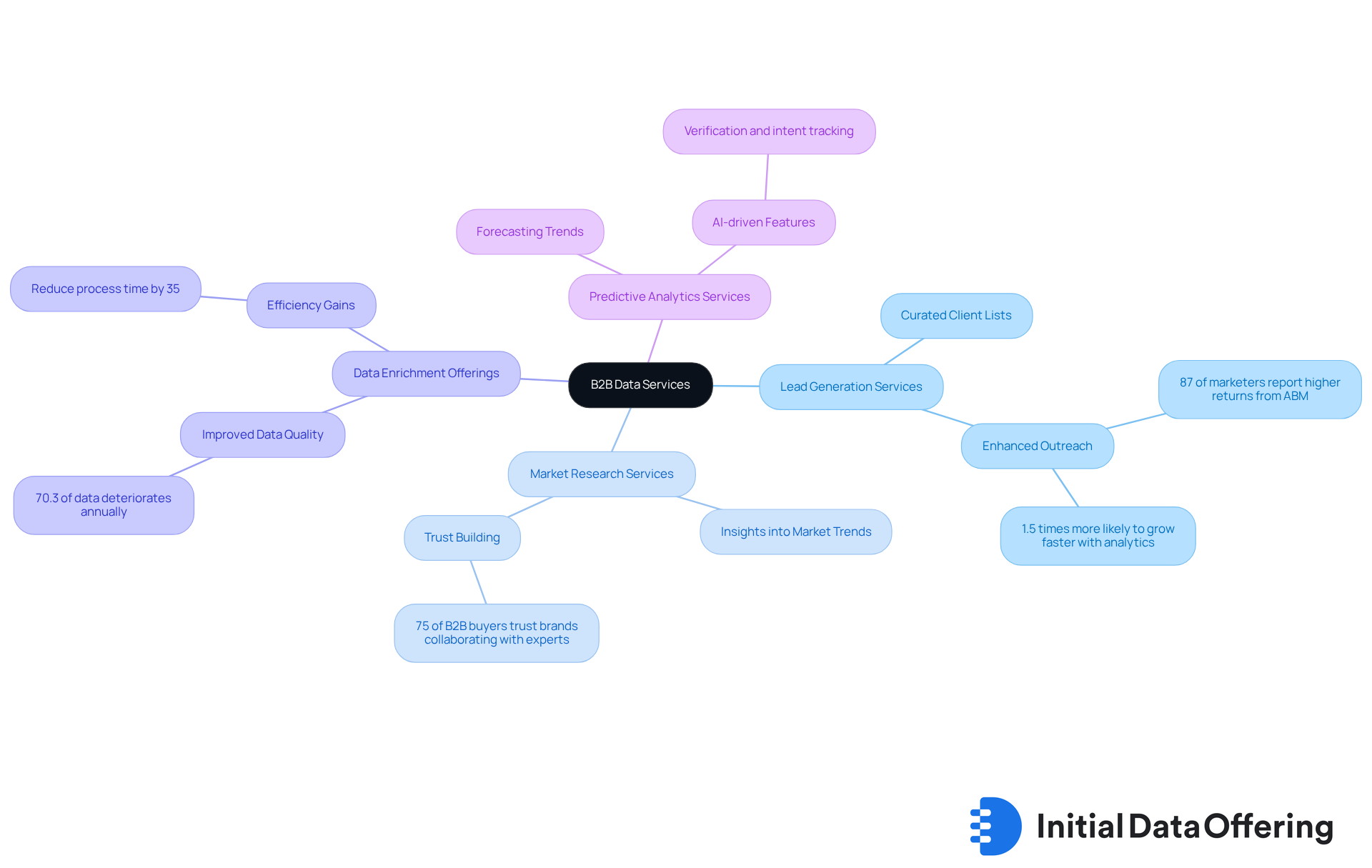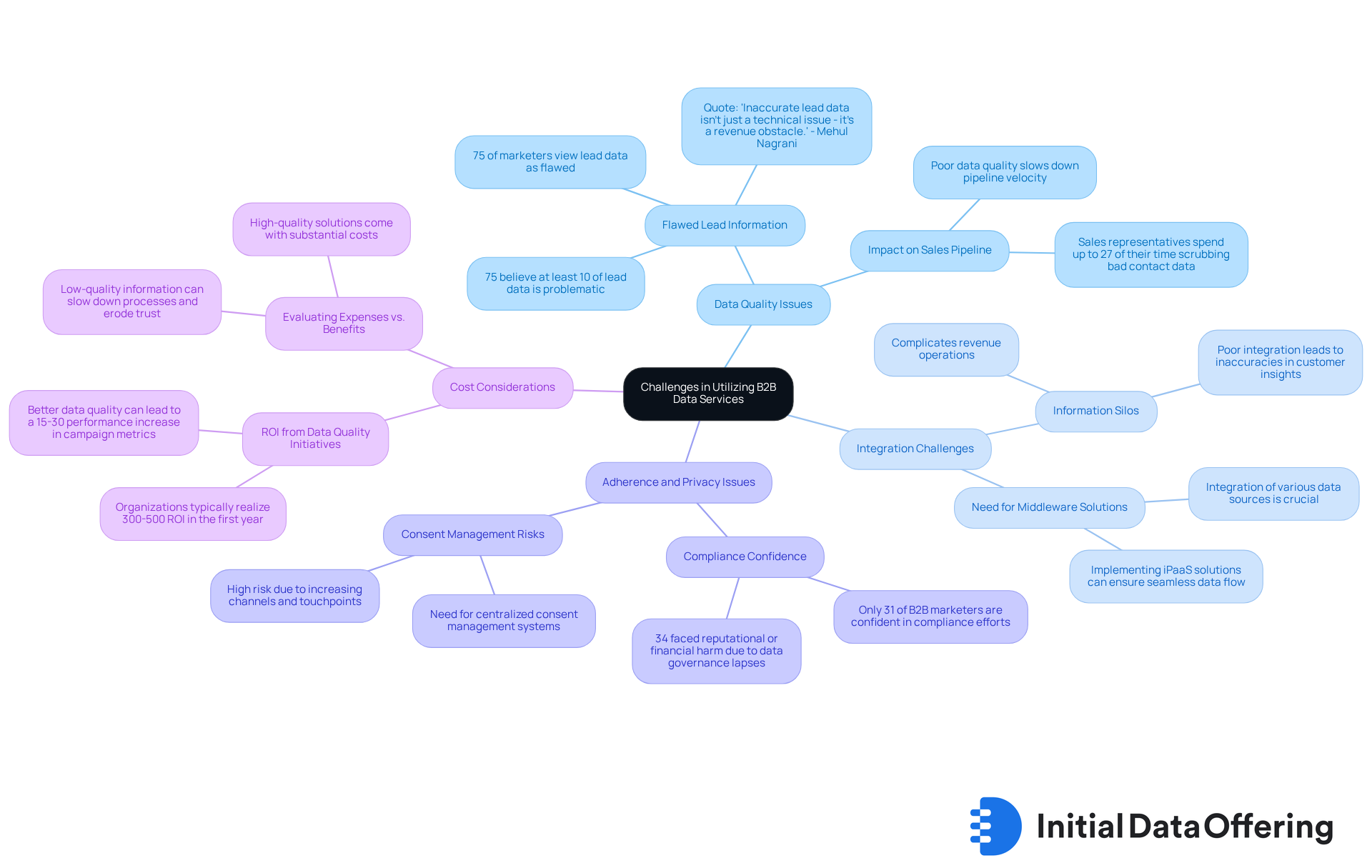Understanding B2B Data Services: Importance and Applications

Understanding B2B Data Services: Importance and Applications
Overview
B2B data services are essential for businesses, offering tailored insights that significantly enhance decision-making, optimize marketing strategies, and improve sales performance by leveraging diverse data types. These services feature advanced analytics and customized reporting, which provide organizations with a competitive edge. The advantages include:
- Faster campaign launches
- Improved lead generation outcomes
Ultimately, these benefits drive growth and efficiency for businesses.
However, organizations must navigate challenges such as:
- Data quality issues
- Compliance with privacy regulations
How can businesses effectively address these hurdles while maximizing the benefits of B2B data services? By prioritizing data integrity and staying informed about regulatory changes, companies can harness the full potential of these services. In conclusion, while B2B data services present substantial opportunities, a proactive approach to managing challenges is crucial for sustained success.
Introduction
B2B data services have emerged as a cornerstone for businesses aiming to thrive in an increasingly competitive marketplace. These services provide critical insights that drive strategic decision-making and enhance marketing effectiveness. As organizations navigate the complexities of client engagement and market dynamics, understanding the diverse applications and benefits of these services becomes essential for sustained growth. However, the promise of enhanced performance is accompanied by challenges that can impede effectiveness.
How can businesses overcome these obstacles to fully leverage the power of B2B data services?
Define B2B Data Services and Their Importance
B2B data services encompass the gathering, examination, and supply of insights specifically tailored for business-to-business interactions. These offerings include a diverse range of information types, such as firmographic, demographic, and behavioral insights. Such data is essential for companies looking to identify potential clients, understand market trends, and refine their marketing strategies. The significance of B2B data services lies in their capacity to deliver actionable insights that facilitate informed decision-making, optimize marketing efforts, and enhance sales performance.
For instance, data-driven marketing enables organizations to gather intelligence on campaign performance, ensuring that past mistakes are not repeated. In a competitive landscape, leveraging premium B2B data services is vital for companies striving to maintain a competitive edge and drive growth. Organizations that adopt analytics-driven marketing strategies can launch campaigns three times faster than their competitors, underscoring the efficiency gains achievable through effective information utilization.
Moreover, case studies illustrate that companies utilizing B2B data services to develop ideal customer profiles and enhance lead generation experience significantly achieve better marketing outcomes. This is exemplified in the 'Marketing Team Data Application' case study. However, businesses also face challenges in harnessing B2B data services, including issues related to information quality and compliance with privacy regulations, which may hinder their effectiveness.
In summary, the transformative impact of B2B data services on overall organizational performance is substantial and cannot be overstated. How can your organization leverage these insights to enhance its marketing strategies and decision-making processes?

Trace the Evolution of B2B Data Services
The evolution of B2B data services has transitioned from companies relying on basic directories and trade publications to connect with potential clients, to a more sophisticated landscape.
- Feature: The advent of the internet has transformed this environment, allowing businesses to utilize online repositories and CRM systems.
- Advantage: This shift facilitates enhanced customer relationship management and efficient information gathering.
- Benefit: As a result, organizations can engage more effectively with their clients.
The rise of large-scale analytics in the 2000s represented a notable turning point.
- Feature: It enabled organizations to handle extensive volumes of information.
- Advantage: This capability supports predictive analysis and focused marketing strategies.
- Benefit: Consequently, businesses can tailor their approaches to meet specific client needs, improving overall effectiveness.
Currently, the sophisticated integration methods, real-time analytics, and the use of artificial intelligence define B2B data services.
- Feature: These technologies work together to improve accuracy and relevance.
- Advantage: They facilitate more informed decision-making.
- Benefit: In turn, companies can maintain a competitive edge in an increasingly data-driven marketplace.
How can your organization leverage these advancements to enhance its operations? By adopting these solutions, businesses can not only streamline their processes but also position themselves strategically in the market.

Explore Types of B2B Data Services and Their Applications
B2B data services include a variety of offerings, each tailored to meet specific organizational needs. The primary categories include:
-
Lead Generation Services: These services provide businesses with curated lists of potential clients based on defined criteria. This enables sales teams to effectively identify and engage high-value prospects. Research indicates that companies utilizing lead generation solutions can significantly enhance their outreach efforts, with 87% of marketers reporting greater returns from account-based marketing strategies compared to traditional methods. Furthermore, B2B companies that leverage b2b data services and analytics are 1.5 times more likely to experience accelerated growth than their competitors, highlighting the critical role of data-driven approaches in lead generation.
-
Market Research Services: These services offer essential insights into market trends, consumer behavior, and competitive landscapes. By harnessing these insights, organizations can make informed strategic decisions that align with current market dynamics. For example, 75% of B2B buyers trust brands that collaborate with industry experts, underscoring the importance of credible market research in fostering trust and driving business growth.
-
Data Enrichment Offerings: These offerings improve the quality and accuracy of existing customer databases by supplying missing information. The significance of enhanced information quality cannot be overstated, as 70.3% of it deteriorates annually, making regular updates and enhancements crucial for sustaining effective marketing and sales strategies. Organizations can also reduce process time by 35% based on deployment assertions, demonstrating the efficiency gained through data enhancement offerings.
-
Predictive Analytics Services: By employing advanced algorithms, these services forecast future trends and customer behaviors. This proactive approach allows companies to adjust their strategies in anticipation of market shifts, thereby optimizing operations and enhancing customer engagement. AI-driven verification and intent tracking have emerged as fundamental features in the rapidly evolving B2B information landscape, showcasing the technological advancements in this domain.
Each of these categories plays a vital role in refining business operations, from enhancing marketing effectiveness to streamlining sales strategies, ultimately driving improved outcomes and informed decision-making with the help of b2b data services.

Identify Challenges in Utilizing B2B Data Services
While B2B data services provide significant advantages, organizations often encounter several challenges during implementation.
-
Data Quality Issues: Inaccurate or outdated data can severely hinder decision-making processes, leading to wasted resources and missed opportunities. A report indicates that nearly 75% of marketers view their lead information as flawed, outdated, or non-compliant, which considerably impacts their sales pipeline. Additionally, around 75% of survey respondents believe that at least 10% of their lead information is problematic. This highlights the necessity for businesses to prioritize information accuracy and automate governance to address these challenges. As Mehul Nagrani, CEO of Integrate, states, "Flawed lead information isn’t just a technical issue - it’s a revenue obstacle."
-
Integration Challenges: Many organizations struggle to seamlessly incorporate B2B data services with their existing systems, leading to inefficiencies and the creation of information silos. Poor integration can lead to inaccuracies in customer insights, complicating revenue operations and hindering strategic decision-making.
-
Adherence and Privacy Issues: As information privacy regulations become increasingly stringent, companies must navigate complex compliance obligations to avoid legal repercussions. Only 31% of B2B marketers express complete confidence in their compliance efforts, underscoring the critical need for robust information governance policies and regular audits to mitigate risks associated with privacy violations.
-
Cost Considerations: High-quality B2B information solutions often come with substantial costs. Organizations must carefully evaluate these expenses against the potential benefits, particularly considering that low-quality information can slow down pipeline processes and erode trust, ultimately impacting revenue.
By recognizing these challenges, businesses can develop strategies to mitigate risks and enhance the effectiveness of their B2B data services, ensuring they leverage data as a strategic asset.

Conclusion
B2B data services are essential in enhancing business-to-business interactions by offering tailored insights that facilitate informed decision-making and optimize marketing strategies. Their significance is profound, empowering organizations to identify potential clients, comprehend market dynamics, and refine outreach efforts. This ultimately leads to improved sales performance and a competitive advantage.
The article delves into various aspects of B2B data services, tracing their evolution from basic directories to advanced analytics-driven solutions. It highlights key categories such as:
- Lead generation
- Market research
- Data enrichment
- Predictive analytics
Each providing distinct advantages that contribute to operational effectiveness. However, challenges persist, including:
- Data quality issues
- Integration hurdles
- Privacy compliance
- Cost considerations
These challenges underscore the necessity for a strategic approach to B2B data services.
Given the transformative potential of B2B data services, businesses are urged to leverage these insights to refine their marketing strategies and enhance decision-making processes. By addressing the challenges related to data utilization, organizations can unlock considerable value, streamline operations, and position themselves for sustained growth in an increasingly data-driven marketplace. Embracing advancements in B2B data services is not merely an option; it is crucial for businesses striving to thrive in a competitive environment.
Frequently Asked Questions
What are B2B data services?
B2B data services involve the gathering, examination, and supply of insights specifically tailored for business-to-business interactions, including firmographic, demographic, and behavioral insights.
Why are B2B data services important?
B2B data services are important because they provide actionable insights that help companies identify potential clients, understand market trends, refine marketing strategies, and make informed decisions to enhance sales performance.
How do data-driven marketing strategies benefit organizations?
Data-driven marketing strategies allow organizations to gather intelligence on campaign performance, enabling them to avoid repeating past mistakes and launch campaigns three times faster than competitors.
What are some outcomes of using B2B data services?
Companies that use B2B data services to develop ideal customer profiles and enhance lead generation often achieve significantly better marketing outcomes, as illustrated by various case studies.
What challenges do businesses face in utilizing B2B data services?
Businesses face challenges such as issues related to information quality and compliance with privacy regulations, which can hinder the effectiveness of B2B data services.
How can organizations leverage B2B data services to improve their performance?
Organizations can leverage B2B data services to enhance their marketing strategies and decision-making processes by utilizing insights to optimize their efforts and drive growth.